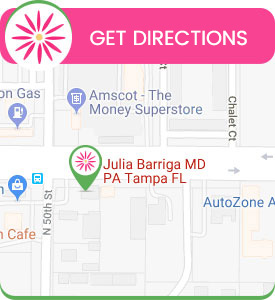Pediatric ADHD Specialist in Tampa FL
At Julia Barriga M.D. P.A., our pediatrician, Dr. Julia Barriga, MD, is experienced in diagnosing and treating ADHD symptoms in children, including the inability to concentrate, excessive physical movement and talking, or inability to sit still. Visit us today for personalized treatment. We are conveniently located at 5001 East Busch Blvd Tampa, FL 33617. For more information, please contact us or request an appointment online.




Table of Contents:
What are the characteristics of children with ADHD?
How do you discipline a child with ADHD?
How do pediatricians deal with ADHD?
What tests are run to confirm ADHD in children?
A pediatric ADHD specialist is a medical doctor who is specially trained to diagnose and treat attention deficit hyperactivity disorder (ADHD) in children. These specialists are knowledgeable about the various symptoms of ADHD, the different treatment options available, and how to help patients and their parents cope with the condition. They understand the unique challenges faced by parents and children who are dealing with ADHD and have the experience needed to provide the best care for children with ADHD. Additionally, pediatric ADHD specialists have experience working with educational professionals and local support groups that can provide additional help for their patients.
The primary characteristics of ADHD include inattention, such as the inability to actively listen, and hyperactive-impulsive behavior, such as novelty-seeking behavior and poor decision-making skills. ADHD symptoms typically start before the age of 12, and in some children, they are noticeable before they turn five. ADHD symptoms can be mild, moderate, or severe, and they may continue into adulthood, especially if unaddressed.
ADHD occurs more often in males than in females, and behaviors can be different depending on the gender affected. For example, boys may be more hyperactive and girls may tend to be more quietly inattentive, although this is only a generalization because it is not always the case.
There are three subtypes of ADHD:
• Predominantly Inattentive — The majority of symptoms fall under inattention.
• Predominantly Hyperactive/Impulsive — The majority of symptoms are hyperactive & impulsive.
• Combined — A mix of inattentive symptoms and hyperactive/impulsive symptoms.
Inattention symptoms include:
• Lack of attention to detail
• Making careless mistakes
• Having trouble staying focused on tasks
• Inability to listen, even when spoken to directly
• Having difficulty following through on instructions
• Failing to finish schoolwork or chores
• Having trouble organizing tasks and activities
• Avoiding or disliking tasks that require focus
• Losing items needed for tasks or activities
• Being easily distracted
• Forgetting to do some daily activities
Hyperactivity and impulsivity symptoms include:
• Fidgeting or tapping hands or feet
• Having difficulty staying seated
• Being on the go, in constant motion
• Running around in inappropriate situations
• Having trouble playing/doing an activity quietly
• Talking too much
• Blurting out answers, interrupting the questioner
• Having difficulty waiting for their turn
• Interrupting others’ conversations, games, or activities
According to pediatric ADHD specialists, the best way to handle a child with ADHD is to:
• Provide Positive Attention
• Give Effective Instructions
• Praise Your Child’s Effort
• Create a Quiet Space to Calm Down
• Ignore Mild Misbehaviors
• Allow for Natural Consequences
There are many approaches that pediatricians can use to treat ADHD, from behavioral modifications and therapy to medications. While medications are commonly prescribed to treat the condition, these drugs, such as stimulants like methylphenidate and amphetamine, can cause adverse side effects, so other measures are typically explored first. If other treatment methods like therapy and behavioral changes do not provide results, medications may be used if the parents are comfortable with this option.
A psychological analysis is used to confirm ADHD in children in most cases, which is based on the following criteria:
• Symptoms cause some impairment and occur in at least two settings, such as home, school, and social situations
• Symptoms have continued for more than 6 months in children 4 to 17 years of age
• 6 or more symptoms must be identified in children 4 to 16 years of age
• Over the age of 17 years, five or more symptoms must be identified
• Symptoms significantly impair the child’s ability to function in some everyday activities, such as relationships with friends, schoolwork, relationships with parents and siblings, or the ability to function in groups or follow directions
• Symptoms start before the child reaches 12 years of age; these may not be recognized as ADHD symptoms until a child is older and are often realized retrospectively
If your child has ADHD or is exhibiting its symptoms, come to Julia Barriga M.D. P.A., for professional care. Contact us today or book an online appointment with our pediatric ADHD specialist, or visit our clinic conveniently located at 5001 East Busch Boulevard, Tampa, FL 33617. We serve patients from Tampa FL, Terrace FL, Greater Carrollwood FL, Lake Magdalene FL, Town ‘N’ Country FL, and surrounding areas. We look forward to serving you!
Check Out Our 5 Star Reviews


Additional Services We Offer
- Dental Fluoride Varnish
- Newborn Care
- Vaccines/Immunizations
- Health Education & Counseling
- Physical Examinations
- Hearing & Vision Screening
- Management of Chronic Conditions
- Comprehensive Well Visits
- Asthma Management
- Diabetes Management
- ADD/ADHD Management
- Diagnostic Services
- Ear Piercing
- Prenatal Consults
- In House Lab Testing
- Get Acquainted Consults
- Covid Testing
- Flu Testing
- RSV Testing








